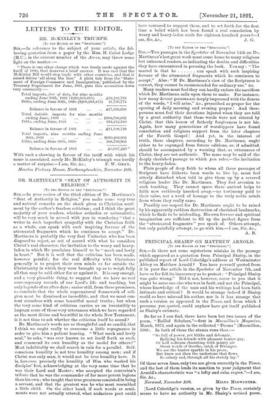DR. MARTINEAU'S "SEAT OF AUTHORITY IN RELIGION."
[To THE EDITOR OF THE " SPECTATOR."1 Sin,—In your review of the third edition of Dr. Martineau's "Seat of Authority in Religion," you make some very true and natural remarks on the shock given to Christian senti- ment by the author's fearless criticism ; and I think the great majority of your readers, whether orthodox or rationalistic, will be very much in accord with you in wondering " that a writer in such imperfect sympathy with the Christian faith as a whole, can speak with such inspiring fervour of the attenuated fragments which he continues to accept." Dr. Martineau is probably the very first Unitarian who has been disposed to reject, as out of accord with what he considers Christ's real character, the invitation to the weary and heavy- laden in which He proclaims himself to be " meek and lowly in heart." But it is well that the criticism has been made, however painful ; for the real difficulty with Christians generally is to project their own minds so far outside the Christianity in which they were brought up as to weigh fully all that may be said either for or against it. It is easy enough, and a very plausible thing, to suggest that we have no real contemporary records of our Lord's life and teaching, but only legends of an after-date ; easier still, from these premisses, to conclude that the whole supernatural framework of reli- gion must be dismissed as incredible, and that we must con- tent ourselves with some beautiful moral troths; but when the very same kind of criticism carries us on irresistibly to impugn some of those very utterances which we have regarded as the most divine and beautiful in the whole New Testament, is it not time to ask whether the criticism itself be sound ?
Dr. Martineau's words are so thoughtful and so candid, that I think we ought really to overcome a little repugnance in order to give him a patient hearing. " What meek and lowly soul," he asks, " was ever known to set itself forth as such, and commend its own humility as the model for others ?" Most indubitably we shall search in vain for a parallel. Self- conscious humility is not true humility among men; and if Christ was only man, it would not be true humility here. It is, however, precisely the humility of Him who washed his disciples' feet, acknowledging at the very same time that be was their Lord and Master; who accepted the centurion's tribute that he was the commander of far more potent legions than his own ; who taught that true greatness consisted in being a servant, and that the greatest was he who most resembled a little child. On the other hand, if such words or senti- ments were not actually uttered, what audacious poet could
have ventured to suggest them, and to set forth for the first time a belief which has been found a real consolation by weary and heavy-laden souls for eighteen hundred years P—I


















































 Previous page
Previous page